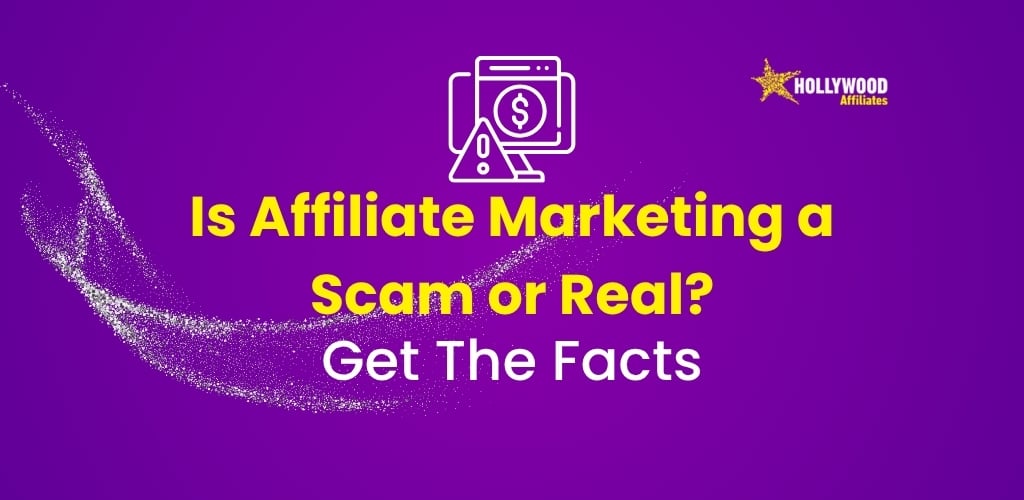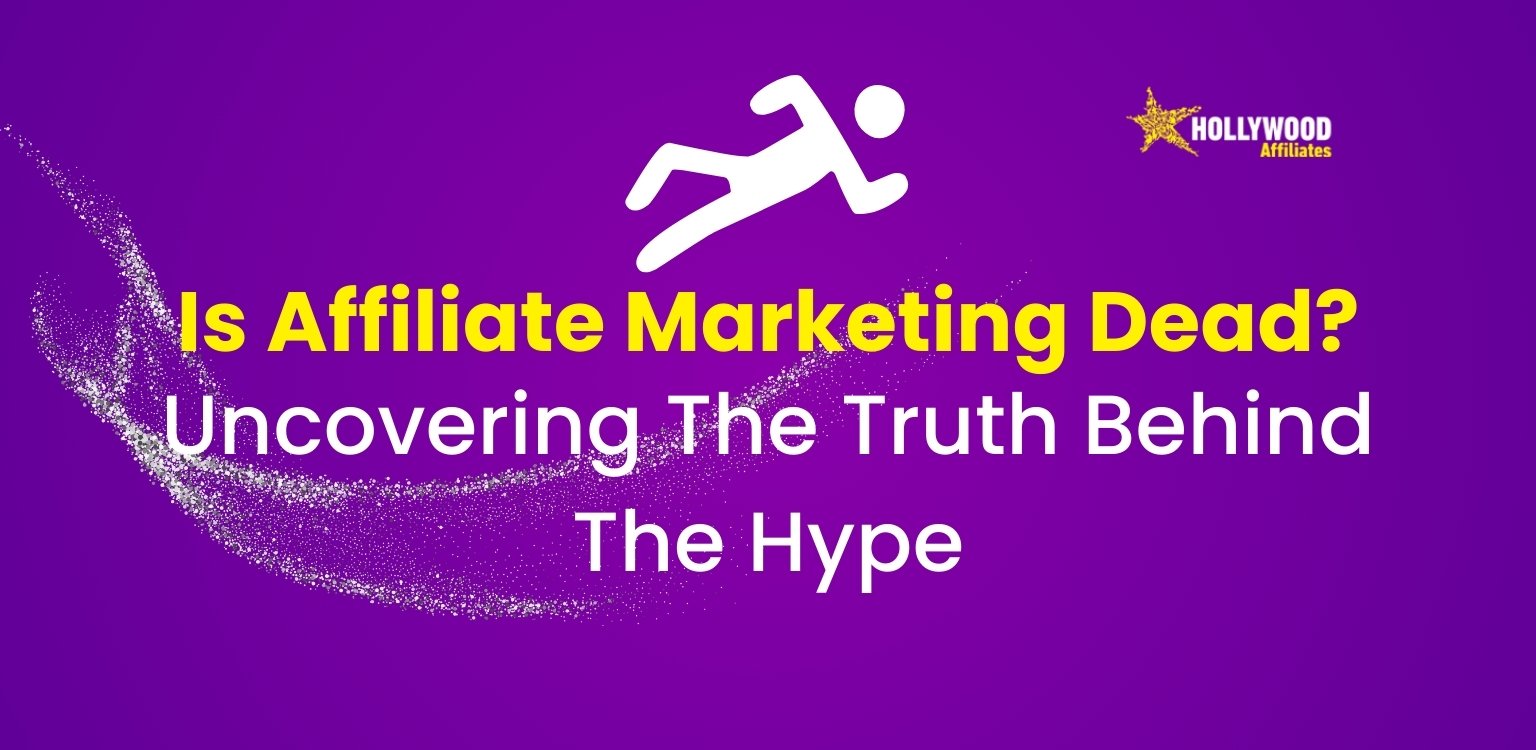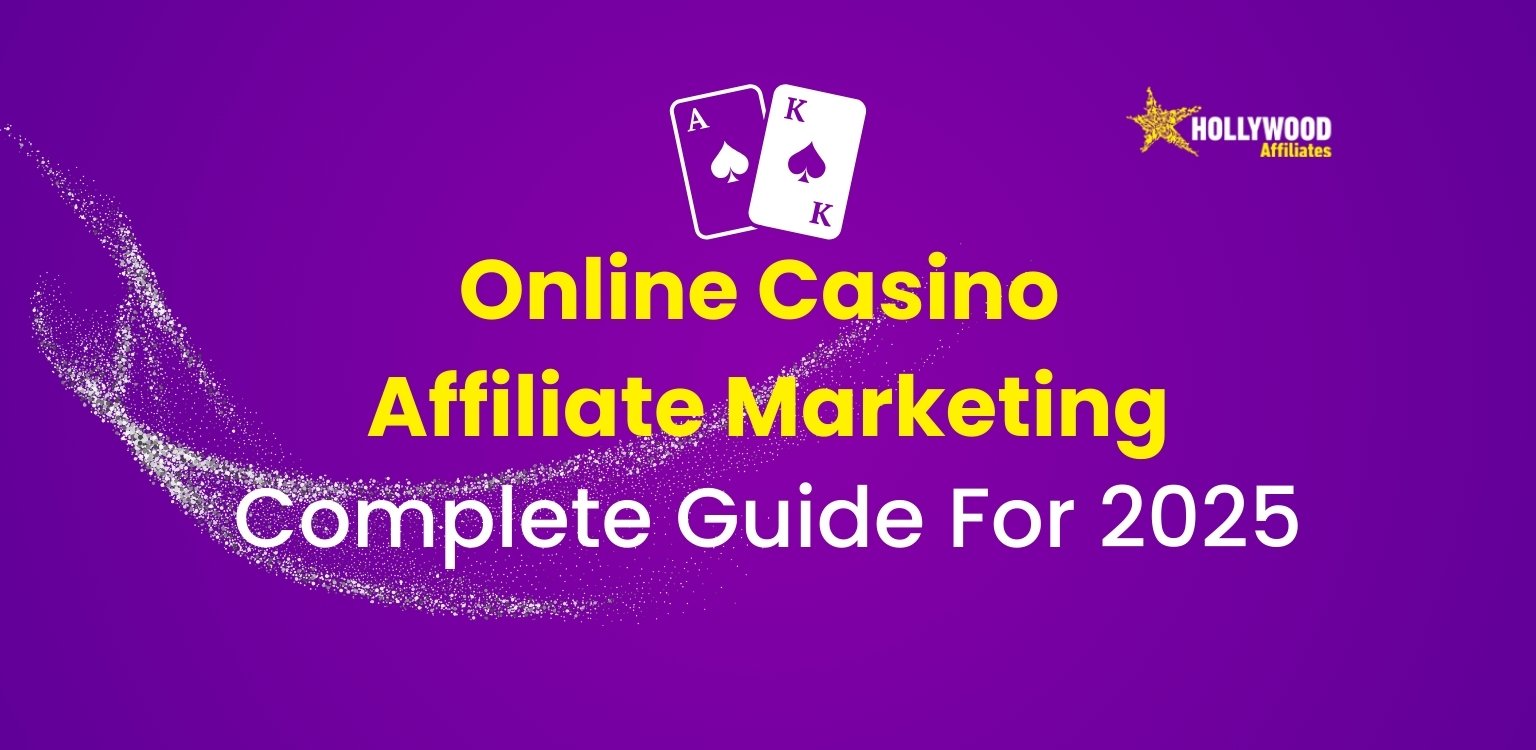Is Affiliate Marketing a Scam or Real?

In today’s digital era, there are many bold claims and striking ads, making it entirely normal to feel skeptical. However, is affiliate marketing a scam or real opportunity? Let’s delve into the reality.
It’s a question many beginners ask, and for good reason. In an online world full of hype, “too good to be true” promises, and fast-money schemes, it’s hard to separate real opportunities from scams if you don’t know how to spot them.
Table of Contents
- Is Affiliate Marketing a Scam?
- Why People Think Affiliate Marketing Is a Scam
- What is Affiliate Marketing?
- How Affiliate Marketing Actually Works
- Common Affiliate Marketing Scams
- Real Affiliate Marketing Scam Cases
- Is High Ticket Affiliate Marketing a Scam?
- Tips to Avoid Affiliate Marketing Scams
- How to Start Affiliate Marketing the Right Way
- Examples of Real Affiliate Marketing Programs
- How Affiliate Marketing Is Changing in 2025
- Final Thoughts
- FAQs
Is Affiliate Marketing a Scam?
No, affiliate marketing, in itself, is not a scam. You can earn commissions by promoting products and services online. However, like any growing industry, fraudsters and “get rich quick” schemes have taken advantage of it.
Personally, I don’t consider affiliate marketing in itself a scam but this business model can be used to scam any of the parties involved, be it customers, affiliates, or the merchants who offer affiliate programs.
The fact is, it’s a legitimate business model that has been used successfully by reputable companies and professional marketers for years. In fact, legitimate programs and affiliates do business all the time. But like any model, it can be misused. Just because the system can be exploited doesn’t mean it’s broken. The key is knowing the difference between ethical marketing and a scam dressed up as affiliate marketing.
The affiliate marketing industry is worth billions and utilized by major brands such as Amazon, Nike, and Adobe. However, the existence of a legitimate model doesn’t guarantee that everyone claiming to teach or provide affiliate marketing opportunities is trustworthy.
Why So Many People Think Affiliate Marketing Is a Scam
Search trends like “affiliate marketing is a scam” show that many people are skeptical. This is not surprising. Scammers have exploited the model to push shady schemes that:
- Sound too good to be true
- Promise overnight riches
- Ask for payment upfront to join
- Focus more on recruiting than selling products
These “affiliate programs” often come with no real product and no reputable affiliate network behind them. They enrich a few people at the top, not the everyday affiliate trying to start an online business.
What is Affiliate Marketing?
Affiliate marketing is a way to earn money by promoting someone else’s product or service online. When someone clicks your special affiliate link and makes a purchase, you earn a commission from the sale. It’s a performance-based model used by companies like Amazon, Booking.com, and Shopify to reward people who help bring in new customers.
For a more in-depth explanation read our post on what is affiliate marketing.
How Affiliate Marketing Actually Works
At its core, affiliate marketing is simple and honest:
You promote a product → Someone clicks your affiliate link → They buy the product → You earn a commission.
For a detailed explanation read our post; How Does Affiliate Marketing Work?
Most affiliate marketing programs are free to join. You get a unique affiliate link, and when someone makes a purchase using that link, you earn money. No magic, no mystery, simply good marketing. Legit affiliate programs often include:
- Transparent commission structures
- Access to marketing materials
- Dashboards to track performance
- Reputable brands and support
Some examples of reputable affiliate networks include Awin, CJ Affiliate, and Amazon Associates.
Common Affiliate Marketing Scams to Watch Out For
If you’re new and unsure whether affiliate marketing is legit or a scam, here are a few red flags to avoid:
1. Pay-to-Join Programs
Legitimate affiliate programs allow you to earn commissions by promoting products or services without any upfront fees. If a program requires payment to join, it’s a major red flag, it may be more focused on profiting from new affiliates than offering real value. Always research thoroughly, read reviews, and be wary of programs that seem overly complex or promise unrealistic earnings.
2. Rich-Quick-Schemes
Affiliate marketing is not a get-rich-quick scheme, it requires dedication, strategic planning, and patience. Success comes from consistently creating valuable content, engaging with your audience, mastering skills like SEO and analytics, and developing a clear marketing strategy.
Building trust and generating income takes time, so persistence is key. By staying committed and informed, new affiliate marketers can overcome setbacks and gradually grow a sustainable online business.
3. Fake Courses and Upsells
Some so-called “affiliate systems” are actually cleverly disguised sales funnels designed to sell overpriced coaching programs or courses that offer little to no real value. These schemes often lure beginners with promises of easy money and instant success, only to upsell them on increasingly expensive training packages filled with vague or recycled information.
Instead of teaching practical affiliate marketing skills, these programs prioritize making money from new recruits rather than helping them succeed. As a result, participants end up spending large sums without gaining the knowledge or tools needed to build a legitimate affiliate business.
4. Google Ads Hijacking
Some affiliates use misleading tactics like bidding on competitors’ brand names in ads, making it seem like their promotions are officially endorsed. This confuses consumers, who may click thinking they’re visiting the brand’s site. These deceptive strategies raise ethical concerns, harm fair competition, and can divert sales away from legitimate businesses.
5. No Product, Just Recruitment
If income is generated solely by recruiting others to pay a fee, rather than through selling products or services, it is not legitimate affiliate marketing but resembles a pyramid scheme. In true affiliate marketing, earnings come from promoting and selling products.
Conversely, pyramid schemes reward recruitment over sales and are illegal. Understanding the differences between these models is crucial to avoid scams that promise easy money but can result in financial loss.
Real Affiliate Marketing Scam Cases
1. Cookie‑Stuffing Fraud (eBay Case)
In 2008, affiliate marketer Shawn Hogan earned over $28 million through eBay’s program using cookie stuffing—illegitimately setting affiliate cookies on users’ browsers so he got credit for unrelated sales. He pleaded guilty to wire fraud, received five months in prison, a $25 000 fine, and probation.
Lesson: Be wary of shady tracking schemes and always check whether affiliate traffic and conversions are genuine.
2. False Attribution & Bot Traffic
Fraudsters use techniques like cookie stuffing, false attributions, and bot-generated clicks to claim commissions they didn’t earn. These scams can drain advertising budgets while delivering zero real conversion value
Lesson: If a small affiliate suddenly brings many clicks but no sales, investigate; mobile click fraud or bot networks may be the cause.
3. Deepfake & Call‑Centre Investment Scams
A large-scale scam scheme in Georgia employed counterfeit celebrity videos, including deepfakes of Ben Fogle, Martin Lewis, and Zoe Ball, while compensating affiliate marketers for referrals to bogus cryptocurrency investment sites. Over 6,000 people lost an estimated £27 million (≈ $35 million)
Lesson: Some affiliates earn fees by funneling people into scams, not by promoting products but by harvesting personal data and feeding call-center fraudsters.
4. Browser Extensions Hijacking Affiliate Links (PayPal Honey)
In late 2024, the Honey browser extension (acquired by PayPal) was revealed to override original affiliate links at checkout, quietly replacing them with Honey’s own. Critics likened this behavior to cookie stuffing, claiming it deprived the original affiliate of deserved commissions.
Lesson: Even popular tools can misuse affiliate systems; always audit affiliate links and tracking integrity on your site.
Watch here: https://www.youtube.com/watch?v=vc4yL3YTwWk
5. High‑Ticket/Pay‑to‑Join Schemes (MOBE and Others)
Programs like MOBE promised a “proven system” to earn big with affiliate marketing but participants had to pay thousands up front, only to discover there was no real business behind it
Lesson: Any program pushing high upfront fees or prioritizing recruitment over genuine product promotion is likely a pyramid scheme in disguise.
Is High Ticket Affiliate Marketing a Scam?
This question: “Is high-ticket affiliate marketing a scam?” comes up a lot.
High-ticket affiliate marketing involves promoting products with commissions of $500 or more. It can be legitimate, but it’s also where scams thrive. Look out if:
- You’re required to pay hundreds or thousands to “unlock” the system
- The focus is on recruiting other affiliates rather than selling a product
- The product itself is vague or low value
When done right, high-ticket affiliate marketing can be lucrative. Make sure the product is high quality. The business model should be clear. There should be a good affiliate network supporting it.
Tips to Avoid Affiliate Marketing Scams
Wondering how to start affiliate marketing safely? Here are some tips to avoid affiliate marketing scams:
- Do your research: Check reviews, Reddit threads, and forums. If people are calling it out as a scam, listen.
- Look for a real product or service: There should be something to promote beyond just joining.
- Avoid “pay to play” models: Real affiliate programs are free to join.
- Check for transparency: Legit programs have clear terms, commission rates, and contact support.
- Use trusted networks: Platforms like Awin, Impact, or Hollywoodbets are generally safe places to start.
How to Start Affiliate Marketing the Right Way
- Pick a niche: Focus on something you’re passionate about or have experience in.
- Join reputable programs: Use the networks mentioned above.
- Create valuable content: Blog posts, videos, email sequences, or social media posts.
- Build trust: Don’t spam. Recommend products that solve real problems.
- Stay patient: Affiliate marketing is a marathon, not a sprint.
To find out exactly how to get started with affiliate marketing read our 2025 step-by-step guide on how to start affiliate marketing for beginners.
Examples of Real Affiliate Marketing Programs
To help ease your worries, here are some real programs that have helped thousands of affiliates earn commissions:
Hollywoodbets Affiliate Program
Hollywoodbets is a leading and rapidly growing betting organization in Africa, now expanding in the UK. It offers a tailored affiliate program that allows partners to promote its sports betting platform and earn income. The Hollywoodbets affiliate program features attractive commission rates, strong marketing materials, and a reliable tracking system, all backed by Hollywoodbets’ solid reputation in online gambling and sports betting.
Amazon Associates Program
Recognized as the premier affiliate program on a global scale, it offers an impressive array of products that cater to diverse interests and needs. With its international accessibility and a user-friendly interface, it makes participation straightforward for everyone. Affiliates have the opportunity to earn commissions by promoting and endorsing a wide variety of items available on Amazon, making it an attractive option for many.
Etsy Affiliate Program
The Etsy program works like a mix of affiliate marketing because the items on the platform are made by individual artisans, vintage sellers, and creative artists. Some overseas manufacturers are trying to join in, but they have not taken over. Essentially, Etsy acts as an affiliate network for small business owners. It has become the top platform in its niche. In a very short time, it has grown from nothing to a publicly listed company.
These are all well-known brands with transparent terms and no upfront costs. We have vetted and reviewed many legitimate affiliate programs that are safe for you to join.
How Affiliate Marketing Is Changing in 2025
The affiliate marketing industry has evolved. It’s no longer just blog links and product reviews. In 2025, trends include:
- Content creators and influencers using affiliate links on platforms like TikTok and Instagram
- Niche site builders creating SEO-optimized content that generates passive income
- Email marketers earning from carefully segmented subscriber lists
- Smarter tracking tools and cookie-less solutions for affiliate attribution
- AI-powered tools helping affiliates generate content faster, personalize product recommendations, and analyze performance metrics more effectively.
Affiliate marketing is becoming more professional, more content-driven, and more aligned with value-based marketing. We have identified 5 cutting-edge affiliate marketing tactics you can use effectively in 2025.
Final Thoughts
So, is affiliate marketing a scam or real? It’s real but like any industry, you need to navigate it wisely. Don’t fall for schemes that sound too good to be true. Use your head, do your homework, and start with legitimate platforms that empower rather than exploit.
Share your experiences or questions in the comments. Have you encountered a scam before? Subscribe to our newsletter for more beginner-friendly affiliate marketing guides.
Frequently Asked Questions (FAQs)
Q: Is affiliate marketing a scam or real?
A: It’s real—used by top brands and marketers worldwide. But beware of scams misusing the model.
Q: Why do people say affiliate marketing is a scam?
A: Scams, fake systems, and get-rich-quick ads have made many suspicious. The core model, though, is legitimate.

Ruaan Kleynhans
Senior Affiliate Marketing Specialist
Fueled by a passion for performance and precision, this seasoned professional has carved a niche in the fast-paced world of online gambling and casino marketing. With years of hands-on experience as a Key Affiliate Account Manager, he blends deep industry knowledge with cutting-edge digital marketing strategies to deliver outstanding results. Renowned for his ability to nurture VIP casino clients and harness analytics for actionable insights, he brings a data-driven mindset to every challenge.





